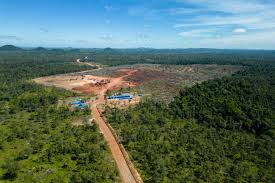With terrorism financing, racketeering and corruption, the timber trade generated over $13.8 million between 2019 and 2021 in Mali, a country that has already lost over 82 per cent of its forest cover since 1960.
A recent report by the Institute for Security Studies (ISS) reveals that illegal logging in Mali generated around $13.8 million between 2019 and 2021, providing significant financial support to extremist organisations such as the Jama’a Nusrat al-Islam wal-Muslimin (JNIM) or ‘Groupe de Soutien à l’Islam et aux Musulmans’ (Support Group for Islam and Muslims, GSIM).
The document indicates that the jihadist alliance affiliated to Al Qaeda in the Islamic Maghreb is profiting from unregulated logging to finance its operations and strengthen its hold on Malian territory.
Since announcing its birth in March 2017, the GSIM has exploited this illegal economy to become a dominant force in the Mopti, Ségou and Timbuktu regions, the ISS report said.
For instance, between 2019 and 2021, illegal logging in the municipality of Kenieba alone, in the western region of Kayes, generated around 13.8 million dollars (8 billion FCFA).
The report also states that Mali has lost more than 82 per cent of its forest cover since 1960, mainly due to excessive logging, urbanisation and agricultural expansion.
Of particular concern is the expansion of GSIM in southern Mali, especially in the Baoulé Reserves between Kayes and Koulikoro.
According to the ISS, these reserves, covering around one million hectares and protected by the United Nations Educational and Cultural Agency, have become a centre of activity for the insurgents. The same document points out that “the extremists are not content just to cut wood; they control access to the reserves and charge access fees to illegal loggers.”
Since 2022, it has also been revealed that GSIM had been charging access fees of around 8 dollars (5,000 CFA francs) per month or per load of wood.
This strategy has enabled the group to consolidate its control and establish a stable source of income, while positioning itself as a protector of local interests in the face of bandits and other threats.
The ISS report also highlights the role of corruption in maintaining this illegal trade. “Malian forestry officials and civil servants often turn a blind eye to the illegal exploitation and export of timber, particularly Kosso, a protected species of rosewood,” it states.
Between 2020 and 2022, some 220,000 Kosso logs were illegally exported to China through the port of Dakar in Senegal, according to the report.
To counter this threat, the ISS recommends “increased international cooperation to revitalise the 2015 Algiers peace agreement and address the grievances of Tuareg separatist groups.”
The organisation insisted that “tougher regulation of logging and the fight against corruption are essential to limit the influence of JNIM.”
MD/ac/fss/GIK/APA


